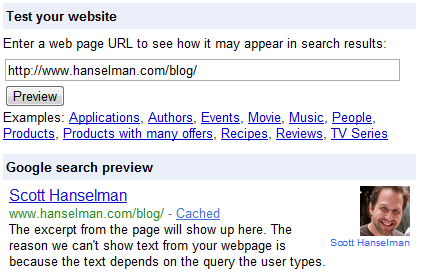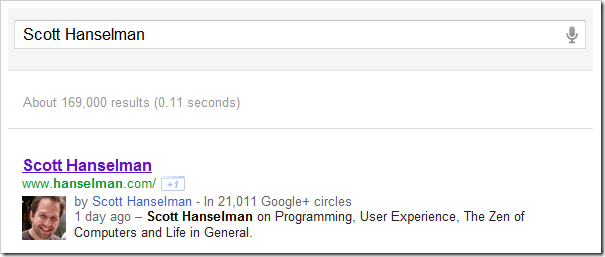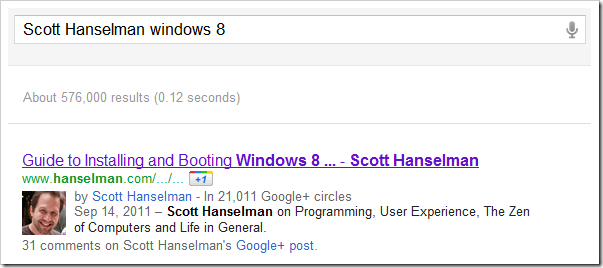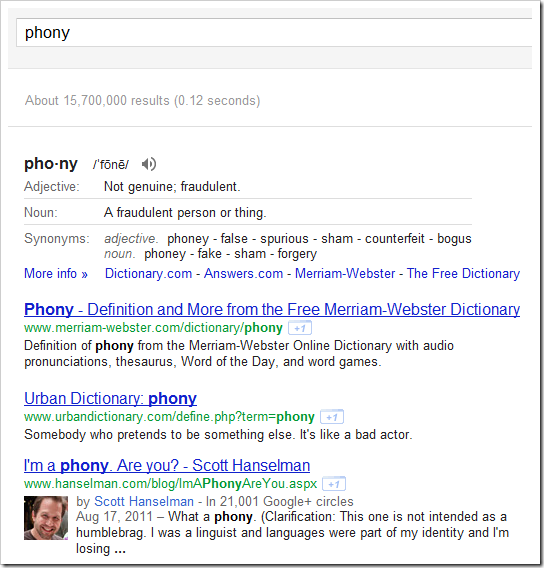Embrace Authorship - The importance of rel=me and rel=author on your content's SEO and Google
There's a lot of garbage out of there on the internet. I know, I've been writing some on this blog for almost 10 years. ;) One way to let Google and Friends know that you are a real person and are really the writer of something is to use microformats like authorship markup like rel="author" to markup your content.
When you write a blog post, make sure that the rel="author" attribute is on the page with a link back to your "About Me" page or to your Google+ profile. The easiest way is to just include a link like this:
by <a title="Scott Hanselman is on Google+" rel="author" href="http://profiles.google.com/hanselman.scott?rel=author" alt="Google+" title="Google+">Scott Hanselman</a>
But it's not proof enough that you wrote something just to link to a profile. You have to close the loop by linking back to your site from your profile, indicating that the page is about your. This will end up looking like this with a rel="me" attribute:
<a href="https://www.hanselman.com/blog/" rel="me" title="Scott Hanselman">Scott Hanselman</a>
While this isn't a perfect way to guarantee to Google that you actually authored and own some content, it's a good start. Presumably if Google trusts your Profile and your website there is an implied chain of trust. If some spammer decides to programmatically steal your entire site, or even just suck it down with RSS and reblog it, it's now possible for Google to downrank those splogs (spam blogs) or delist them, while simultaneously assigning a higher Page Rank - or Author Rank - to your site.
Alternatively you can have an "author page" or About Me page on your site within the same domain and use rel="author" to point to it. You then use rel="me" to markup links that all point to sites that represent the same person. If you are using rel="author" to point to an About Me page, that page should the include a link with rel="me" that points to your Google Profile.
If this seems confusing, you can use the Rich Snippets Testing Tool to test our your pages and how they might show up if Google decides to trust you.

The most important part with the Rich Snippets Testing Tool is the Extracted Author info. Does Google successfully extract that you are an author and show those links without errors or warnings?
At this point, you know only that Google doesn't think you suck but you have no idea if they will actually use the data. This appears to be where magic pixie dust comes in. You essentially wait a week or two and if it works, when you start Googling for your articles they will start showing up like this in search results:
Or a specific article, for example:
Note that Google shows that I'm in some Google+ circles and that there's 31 comments on a G+ post on this blog post.
Aside: This starts to seem a little unbalanced to me, as Google could have looked at my RSS feed or RSS Comments Feed and determined how many actual comments there are on that post on my site. Or, I could include microformat metadata on comments to indicate that they are comments vs. original content. I want the discussion to happen on my blog, not on Google+. Or maybe I want the conversation to happen on Disqus, or on Facebook. It's too bad that Google doesn't support a microformat like rel="comments" (I made that up) so that I might take control of the URL where comments should be left. Maybe I want Twitter or Facebook profiles to be used with rel="author." With the addition of Google+ and the "convenience" of using Google+ for rel="author" and the automatic retrieval of comment metadata, again from Google+, the open markup-based Google The Search Engine plus Google+ The Social Networks becomes a walled garden without choice, like Facebook.
Commentary on openness put aside, the usefulness of rel="author" in the context of Google users and from the perspective of the content author is obvious.
- Search results that list pages written by actual humans alongside their smiling faces will be more likely to be clicked on.
- Folks can +1 results directly from the results AND add you, the author, to their Google+ circles.
Of course, I'm not sure what I think about searching Google for the word "phony" and finding my face show up as the result. ;)
The task for you, Dear Reader, is to go forth and implement rel="author" for your blogs and content.
About Scott
Scott Hanselman is a former professor, former Chief Architect in finance, now speaker, consultant, father, diabetic, and Microsoft employee. He is a failed stand-up comic, a cornrower, and a book author.
About Newsletter
The idea is fine when people play fair. Citing a blog post from someone else, attribute it to them. But those playing the content stealing game, will still get your content and replace these tags/attributes with their own. Do we really gain anything on the later scenario?
Worst, why would they penalize those who play fair and attribute the content to the original author. Consider you give permission to someone to post a few of your blog posts, you want the content on your site to be the one on searchs, but this shouldn't get their other authored content on other pages penalized. Talk about a mad panda.
In most cases writing a small summary or only reposting the start of the article and then linking to the original would be considered much more useful as you now have access to the original source, you can join the original discussion about the topic and you may get more content from that source if it's interesting to you as a user.
Do you know if this will work with gplus.to? I missed the boat getting a vanity url for my gplus profile page. Its no biggie i could just use the profile id but definately feels better to use a vanity url.
any oideas?
Cheers
Dave
This once-amazing tool is now turning into a patchwork quilt of hacks and tricks. In my opinion they've lost direction, switched to headless-chicken-mode, and are expecting the content publishers themselves to do too much of their work for them. They should shut down half of the freebee side projects they run (which are hurting small outfits, and half of which don't even work properly any more) and concentrate on getting back on top with a proper search strategy. What we have now feels too much like some Heath-Robinson contraption held together with duct-tape.
We have absolutely zero transparency regarding how they come to their decisions, and considering that they are now the de-facto judge, jury, and executioner of websites, that is pretty scary. Especially as they are often bringing in sweeping reactionary changes that are randomly injuring legitimate enterprises (Panda anyone), while seemingly endorsing content of questionable worth (not to mention their own investments - e.g. YouTube).
Bing: please get your shit together...
RDFa is such a better solution from a technical perspective, imho.
Sosh - Yep.
One issue I saw is that in your rel="author" example link above you have specified the title attribute twice; once at the start and then again at the end.
https://spreadsheets.google.com/spreadsheet/viewform?formkey=dHdCLVRwcTlvOWFKQXhNbEgtbE10QVE6MQ&ndplr=1
So I just add?
< a href="http://[some spam site]" rel="me" title="Scott Hanselman">Scott Hanselman</ a>
*starts filling the net with Scott Hanselman content*
hehe
My point is, are we going towards an authoring war where anyone can make pages (briefly?) appear to belong to someone else?
Fyi… The 2011 default WordPress theme (TwentyEleven) has this baked-in from the start.
Thanks for the "soon to be relevant for me" information, and, also, for one of the biggest laughs I have had in a while.
When you have a recent blog post "I am a phony, are you?", having your picture appear when searching Google for the word "phony" is your own %#@& fault... ;P
Cheers
Regards,
Lelaki Kacak
It seems Google now has a specialized way to verify authorship:
https://plus.google.com/authorship
Reminded me of your post once I saw the link. I already used your tips to show authorship of my http://gurustop.net blog posts long time ago. Thanks BTW!
Comments are closed.





Nice post but I believe that Google now encourage people to implement the stuff introduced on schema.org. I am not sure that this one is documented there but here is the article schema :
http://schema.org/Article
Here is the blog schema :
http://schema.org/Blog